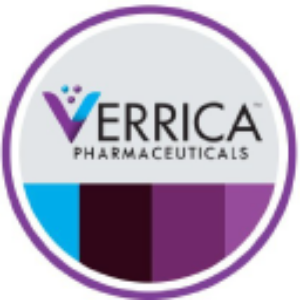Verrica Pharmaceuticals Announces Positive Preliminary Topline Results from Part 2 of Phase 2 Clinical Study of VP-315, an Investigational Oncolytic Peptide-Based Immunotherapy for the Treatment of Patients with Basal Cell Carcinoma
Rhea-AI Summary
Verrica Pharmaceuticals announced positive preliminary results from Part 2 of its Phase 2 clinical trial for VP-315, an investigational oncolytic peptide-based immunotherapy for basal cell carcinoma (BCC). Key findings include:
- No treatment-related serious adverse events reported
- Overall 86% reduction in tumor size for all treated lesions
- 51% of lesions achieved complete histological clearance
- Patients with residual tumor achieved an average 71% reduction in tumor size
The company views VP-315 as a potential first-line therapy for BCC, with possible use in primary and neoadjuvant settings. Verrica plans to request an End-of-Phase 2 meeting with the FDA in the first half of 2025 to determine next steps for VP-315's development.
Positive
- VP-315 demonstrated an 86% overall reduction in tumor size for all treated lesions
- 51% of treated lesions achieved complete histological clearance
- Patients with residual tumor achieved an average 71% reduction in tumor size
- No treatment-related serious adverse events were reported
- VP-315 has potential as a first-line therapy for basal cell carcinoma
- The company views VP-315 as a potential multi-billion dollar commercial opportunity
Negative
- 49% of treated lesions did not achieve complete histological clearance
- Full genomic and T-cell (immune response) data are not yet available
News Market Reaction 1 Alert
On the day this news was published, VRCA declined 40.80%, reflecting a significant negative market reaction.
Data tracked by StockTitan Argus on the day of publication.
VP-315 was well tolerated with no reported treatment-related serious adverse events
All patients treated with VP-315 had a reduction in tumor size with an overall reduction in tumor size of all lesions treated in Part 2 of approximately
Approximately
Patients with residual tumor on average achieved an approximate
~3.6 million basal cell carcinomas diagnosed in the U.S. each year, which is expected to continue to grow due to aging US population, better diagnosis and increased exposure to risk factors
WEST CHESTER, Pa., Aug. 14, 2024 (GLOBE NEWSWIRE) -- Verrica Pharmaceuticals Inc. (“Verrica” or “the Company”) (Nasdaq: VRCA), a dermatology therapeutics company developing medications for skin diseases requiring medical interventions, today announced preliminary positive results from Part 2 of its Phase 2 clinical trial studying VP-315, a potential first-in-class oncolytic peptide, for the treatment of basal cell carcinoma.
“We believe the positive results from Part 2 of the Phase 2 study for VP-315 are a meaningful step forward in potentially providing basal cell carcinoma patients with additional treatment options,” said Ted White, President and Chief Executive Officer of Verrica. “We are encouraged by our preliminary results, which we believe support the use of VP-315 as a first line therapy for use in both a primary and neoadjuvant setting. We believe VP-315 has the potential to be a multi-billion dollar commercial opportunity for Verrica.”
“Basal cell carcinoma is the most common form of cancer in the U.S. and current therapies have drawbacks, including systemic side-effects,” said Dr. Gary Goldenberg, Verrica’s Chief Medical Officer. “The preliminary results from Part 2 of the trial show greater than
“VP315 has the potential to change the way dermatologists treat basal cell skin cancer. Patients may be cured with simple injections of VP-315,” said Dr. Jonathan Kantor, a dermatologist and Mohs surgeon at Florida Center for Dermatology, which was the leading enrollment site for the clinical study. “Those patients that have residual tumor, can have surgery and decrease their surgical scar by more than
The Phase 2 trial is a 2-part, open-label, multicenter, dose-escalation, proof-of-concept study with a safety run-in designed to assess the safety and tolerability, pharmacokinetics, and efficacy of VP-315 when administered intratumorally to adults with biopsy-proven basal cell carcinoma. The study enrolled 92 adult subjects with a histological diagnosis of basal cell carcinoma in at least one eligible target lesion. For additional information about this clinical trial, please visit clinicaltrials.gov, identifier NCT05188729.
Part 2 preliminary results are based on 93 confirmed basal cell carcinoma lesions that were treated during Part 2 of the Phase 2 trial; however, for histologic reduction in tumor size and overall reduction in tumor size, data from three of the 93 lesions are pending. The key preliminary Part 2 results were:
- No dose-limiting toxicities or Treatment-Related Serious Adverse Events were reported. Most Treatment Related Adverse Events were expected mild to moderate cutaneous reactions (n=93).
51% of lesions treated resulted in complete histologic clearance, with no residual tumor cells (n=93).- Histological reduction of tumor size in those subjects with remaining tumor was
71% (n=90). - All patients treated with VP-315 had a reduction in tumor size with an overall reduction of tumor size in all subjects (those with no residual tumor and those with residual tumor) of
86% (n=90).
The Company expects genomic and T-cell (immune response) data in the first quarter of 2025 and plans to request an End-of-Phase 2 meeting with the FDA to determine next steps for the development of VP-315 for the treatment of BCC in the first half of 2025. The Company also plans to submit the final Phase 2 data for presentation at future medical meetings.
About VP-315
VP-315 is a potential first-in-class oncolytic peptide immunotherapy designed to be administered directly into a tumor to induce immunogenic cell death, which may offer a non-surgical option for patients suffering from skin cancer. The technology is based on pioneering research in “host defense peptides” – nature’s first line of defense towards foreign pathogens. VP-315 is a chemotherapeutic administered intratumorally and works by inducing lysis of intracellular organelles of tumor cells such as mitochondria, thereby unleashing a broad spectrum of tumor antigens for T cell responses. Verrica has an exclusive worldwide license to develop and commercialize VP-315 for dermatologic oncology indications, including non-metastatic melanoma and non-metastatic merkel cell carcinoma, and intends to focus initially on basal cell and squamous cell carcinomas as the lead indications for development. VP-315 has demonstrated positive tumor-specific immune cell responses in multi-indication Phase 1/2 oncology trials. The timing of any future clinical trials of VP-315, if any, will be determined after the conclusion of the current Phase 2 trial for basal cell carcinoma.
About Basal Cell Carcinoma
Basal cell carcinoma is the most common form of cancer in the U.S., and incidence is rising worldwide. There are approximately 3.6 million diagnoses of basal cell carcinomas in the U.S. each year, with a high unmet need for new treatment options. Basal cell carcinoma is generally treated with invasive surgery to remove the tumor, which can cause pain, infection, bleeding and scarring.
About Verrica Pharmaceuticals Inc.
Verrica is a dermatology therapeutics company developing medications for skin diseases requiring medical interventions. Verrica’s product YCANTH (VP-102) (cantharidin), is the first and only commercially available treatment approved by the FDA to treat adult and pediatric patients two years of age and older with molluscum contagiosum, a highly contagious viral skin infection affecting approximately 6 million people in the United States, primarily children. YCANTH (VP-102) is also in development to treat common warts and external genital warts, two of the largest remaining unmet needs in medical dermatology. Verrica is developing VP-103, its second cantharidin-based product candidate, for the treatment of plantar warts. Verrica has also entered a worldwide license agreement with Lytix Biopharma AS to develop and commercialize VP-315 (formerly LTX-315 and VP-LTX-315) for non-melanoma skin cancers including basal cell carcinoma and squamous cell carcinoma. For more information, visit www.verrica.com.
Forward-Looking Statement
Any statements contained in this press release that do not describe historical facts may constitute forward-looking statements as that term is defined in the Private Securities Litigation Reform Act of 1995. These statements may be identified by words such as “believe,” “expect,” “may,” “plan,” “potential,” “will,” and similar expressions, and are based on Verrica’s current beliefs and expectations. These forward-looking statements include, but are not limited to, statements concerning the potential of VP-315, the Company’s research, development and regulatory plans for VP-315, the timing of the Company’s planned clinical trials for VP-315 and reporting data from the Company’s clinical trials, the willingness of healthcare professionals to use VP-315 for the treatment of basal cell carcinoma, the Company’s competitive position and the development of and projections relating to the Company’s competition, changes in the rates of incidence of basal cell carcinoma and the potential market size opportunity for the treatment of basal cell carcinoma. These statements involve risks and uncertainties that could cause actual results to differ materially from those reflected in such statements. Risks and uncertainties that may cause actual results to differ materially include uncertainties inherent in the drug development process and the regulatory approval process, Verrica’s reliance on third parties over which it may not always have full control, and other risks and uncertainties that are described in Verrica’s Annual Report on Form 10-K for the year ended December 31, 2023, Verrica’s Quarterly Report on Form 10-Q for the quarter ended March 31, 2024 and other filings Verrica makes with the U.S. Securities and Exchange Commission. Any forward-looking statements speak only as of the date of this press release and are based on information available to Verrica as of the date of this release, and Verrica assumes no obligation to, and does not intend to, update any forward-looking statements, whether as a result of new information, future events or otherwise.
FOR MORE INFORMATION, PLEASE CONTACT:
Investors:
Terry Kohler
Chief Financial Officer
tkohler@verrica.com
Kevin Gardner
LifeSci Advisors
kgardner@lifesciadvisors.com
Chris Calabrese
LifeSci Advisors
ccalabrese@lifesciadvisors.com








